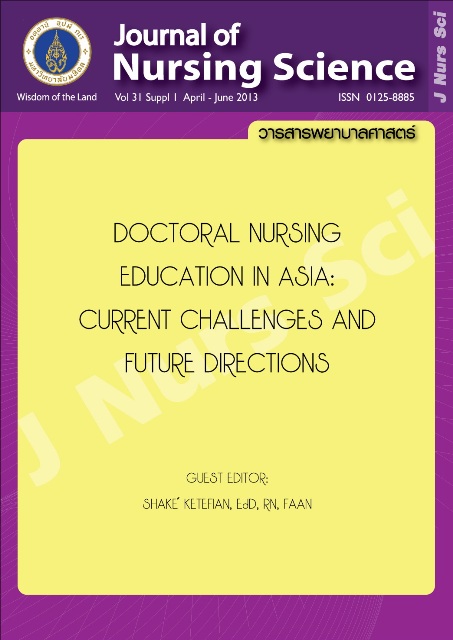Doctoral Nursing Education in Asia; Current Challenges and Future Directions: A Synthesis
Main Article Content
Abstract
The editors designed this supplement to assess the state of doctoral education in the Asian region, mostly concerned with research-focused doctorates. Four countries participated: Japan, Korea, Taiwan, Thailand, although more were asked to participate. The editors and guest editor developed a general outline identifying topics to be covered; they further identified several nurse scholars from each country from different institutions to author a chapter on doctoral education in their country. The goal was to assure that authors did not succumb to the temptation of describing their own institutions, but rather, took a national perspective, and considered the broad picture in the country. In one instance, while two individuals were invited to serve as co-author, we have one author; this was due to a technical problem that was not discovered till it was too late in the process. The problem was that the second author never received our invitation. By the time the problem became apparent to us, the chapter was already prepared by the one author.
The outline suggested to the authors was as follows:
1. Provide a broad picture of doctoral education in the country. Involves an overview of doctoral programs, including some statistical information on number of programs, overall number of students, faculty, current status; model of doctoral education in use and areas of nursing science offered.
2. Any national or broader networks used to support and network with within the country or internationally; how such networks are used and what their impact may be.
3. Types of collaboration in place with institutions in other countries, and what their focus is; the extent to which faculty and/or doctoral student exchanges occur.
4. Marketplace for doctorally prepared nurses in the country.
5. Some challenges facing doctoral education in your country, such as funding issues, faculty shortages, research supervision and mentorship issues, extent to which emerging research is incorporated in the doctoral curriculum, the development of global standards for the program, others?
6. Future directions: what is the desired future for doctoral education in the country, in terms of education, programmatic directions, research, other?
Thus, it was not our intent to present an exhaustive coverage of doctoral education in the region, but rather, to describe a broad picture and emerging directions, engage in some comparative analyses, where feasible, and to make recommendations.
Article Details
Copyright Notice: Nursing Science Journal of Thailand has exclusive rights to publish and distribute the manuscript and all contents therein. Without the journal’s permission, the dissemination of the manuscript in another journal or online, and the reproduction of the manuscript for non-educational purpose are prohibited.

Disclaimer: The opinion expressed and figures provided in this journal, NSJT, are the sole responsibility of the authors. The editorial board bears no responsibility in this regard.


